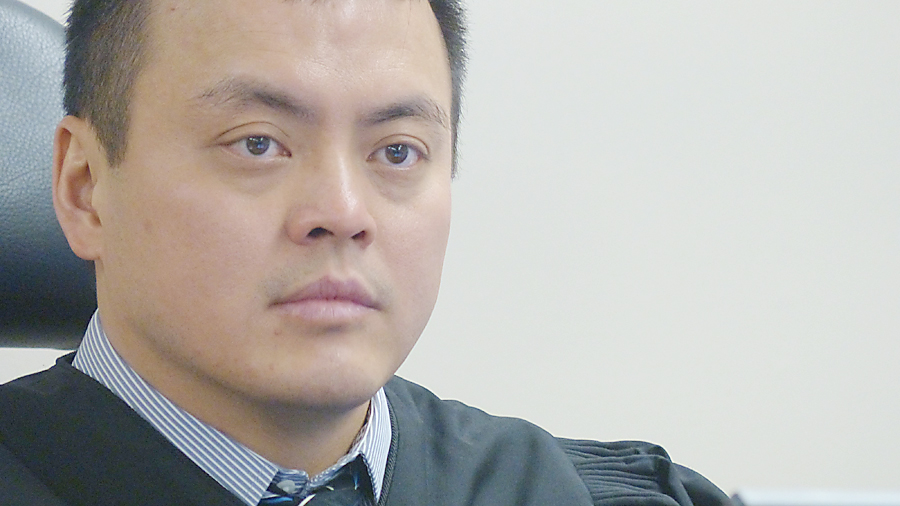
Malheur County Circuit Judge Lung Hung, the presiding judge, wants to clear the hurdles to placing children with relatives in Idaho when they are removed from parents in Malheur County. He conducts regular hearings on the status of foster children. (Malheur Enterprise/Les Zaitz)
VALE – The two boys, 3 and 6, needed a place to go.
State workers had removed them from their home in early February because of allegations they had been abused by their mother.
The boys were shuttled to a stranger’s home, put in the care of foster parents they had never met.
Caseworkers quickly found a grandmother across the river in Idaho who was willing to take them in.
But bureaucracy loomed and complex rules got in the way.
Instead of going to grandma’s house, they are still with the Oregon foster parents.
Malheur County Circuit Judge Lung Hung wants that to change. He’s been pressing officials in Oregon and Idaho for two years to strike an agreement so children in either state can readily be placed with relatives across the state line if they need foster care.
Headway is slow coming, to Hung’s frustration. He tried to prod along talks between the two states last fall, writing to top state officials and copying state legislators and judges in Oregon and Idaho.
“As a judge, it breaks my heart to remove children from their parents’ home due to deficiencies in that environment and place those children in non-relative foster care when there is a loving family member only a few miles away, but across a state line,” Hung wrote last November.
“There can be no doubt that the trauma these children experience from being removed from their homes is greatly reduced when they are placed with someone they know and someone they love,” Hung said.
The need has grown as the number of children in foster care in Malheur County has surged. The county is short of general foster homes. Increasingly, relatives such as grandparents or aunts and uncles are asked to step in as temporary parents.
But the Snake River slows that process with what one state official called “the invisible line.”
Currently, judges such as Hung can approve placing a child with out-of-state relatives. They can trigger a mechanism in an interstate compact for a hurried placement, short circuiting what can be months of waiting for another state to act. But while the so-called “Regulation 7” provides for children to go to out-of-state relatives within 20 days, reality has proven different. The case of the two boys removed in February is such a case – a placement that technically could have been made in days has turned into a weeks-long wait.
Patricia Sullivan, Malheur County Circuit Court senior judge, said dealing with impediments to placing children in Idaho was “one of the most frustrating things for me as a judge.”
She recalled a case where children were removed from an Ontario mother but couldn’t go to a grandmother across the river in Fruitland. The mother and grandmother switched houses so the children could live with a relative.
Sullivan said cross-border arrangements now take too long.
“We need to speed that system up,” she said.
Oregon has solved the problem before, with its Washington neighbor. In 2014 , two states inked a deal that moves children to relatives quicker. A state asked to approve a cross-border transfer is expected to act within seven days.
The cross-border deal also makes more people eligible to serve as temporary parents. A nationwide interstate compact permits only primary relatives to do so. Under the Washington pact, relatives such as cousins and aunts and even school teachers can serve as the out-of-state foster parents.
“It’s a very valuable tool,” said Vera James, interstate compact manager for Oregon’s Department of Human Services. “It certainly helps caseworkers rather than have the child in strangers’ homes.”
She cited the example of a child of Russian parents who spoke only Russian. The child had been placed in a home where no one spoke Russian before being placed with Washington relatives who could speak the language.
“That made a huge difference for that child,” James said.
James said the pact with Washington hasn’t been used as often as officials expected. Since 2014, 80 children have been placed in Washington and 34 placed in Oregon.
She said it has been “fairly slow going” to reach a similar deal with Idaho.
James noted that eight years of work went into finishing the deal with Washington.
Leading state officials assured Hung they would pursue an Oregon-Idaho deal.
“I agree that disruptions in a child and family’s life is lessened when children can be safely supported by someone they know and trust, even if that means going across state lines,” said Fariborz Pakseresht, director of Oregon’s DHS in a November letter to Hung. He said he has asked his staff for a list of “sticking points” he can help resolve.
Russell Barron, director of the Idaho Department of Health and Welfare, wrote Hung that there are “numerous issues that must be worked through” and that Idaho had formed “a multidisciplinary stakeholder team to assist in the development of a border agreement.”
Child welfare officials from both states talked in January.
“Both agreed they would look into process mapping and we would do the same,” said Roxanne Printz, a program manager in Idaho’s Department of Health and Welfare.
She said Idaho authorities in the coming weeks will meet with local prosecutors, judges and others in counties bordering Malheur County. Printz said they’ll be consulted about what a border deal should look like and how the Idaho system would handle its new role.
“Idaho does a pretty job of being creative,” Printz said.
Child welfare officials are aiming to talk again in May.
Printz understands the frustration with the pace but said making a mistake could make matters worse for children.
“We do need to take precautions and do our job,” she said.
Note: This is the third article in a four-part series on challenges facing the foster care system in Oregon and Malheur County.
PART I: Malheur County system in crisis
PART I: Volunteers focus on speaking for kids
PART II: Foster parents face state neglect
Les Zaitz: [email protected], 541-473-3377
SUPPORT LOCAL JOURNALISM – CLICK HERE




